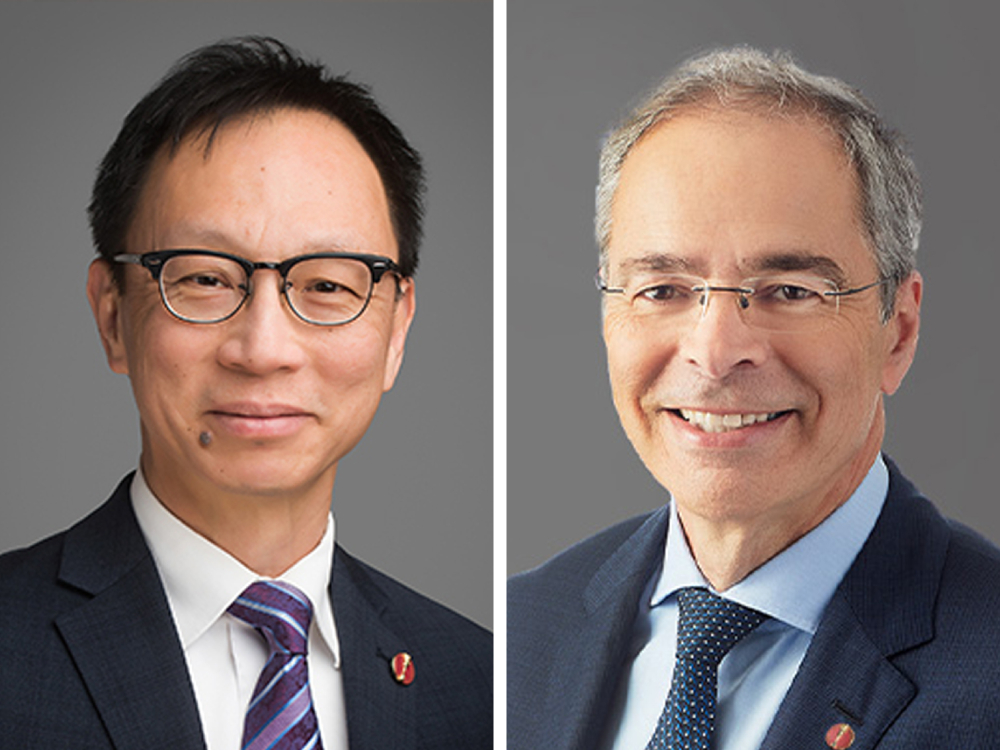The pandemic has small businesses struggling to survive and many people laid off from their jobs. It’s tight times pretty much everywhere in Canada except, it seems, its Senate.
Which is why Sen. Pierre Dalphond is going to make a few enemies in the Red Chamber on Tuesday — and a great many friends among Canadian taxpayers.
Dalphond, a senator from Joliette and former senior judge on the Quebec Court of Appeal, plans to table a motion asking the Senate to repeal salary increases for committee work it approved last March.
Dalphond said the additional pay for six positions is a “disheartening and irresponsible” use of the Senate’s power. It’s also antithetical to the Trudeau government’s commitment to reforming the Senate, he said.
“The goal of Senate reform is a more independent, transparent and accountable institution that enhances public confidence in our work on behalf of Canadians,” Dalphond told The Tyee. “I do not think it is an appropriate use of public funds to quietly create new paid positions.”
Dalphond is most concerned about the extra pay for the chair and deputy chair of the Senate’s selection committee.
Unlike other Senate committees, the selection committee just approves the results of negotiations between different Senate groups on the allocation of seats on committees.
“That is the normal bailiwick of the leader or the whip, and no bonus should be paid for the performance of core duties,” Dalphond said. “Serving in the Senate is an enormous privilege and public responsibility, and the taxpayer-funded salary of $157,000 is generous.”
The motion allowing the chair of the selection committee to collect an extra $12,500 annually was moved by British Columbia Sen. Yuen Pau Woo, appointed to the Senate in 2016 by Prime Minister Justin Trudeau.
Woo, who leads the largest caucus in the Senate, the Independent Senators Group, worked out the deal with Conservative caucus leader Don Plett, the Opposition leader in the Senate.
For that role, Plett receives $41,300 in addition to his Senate salary. Woo, who is technically not the leader of a traditional party in the Senate, receives no extra money for leading the independent group.
Plett named Sen. Carolyn Stewart-Olsen as deputy chair of the selection committee, entitling her to an additional $6,200 per year. Woo named himself as chair and is now collecting an additional $12,500 annually.
Woo did not respond to a Tyee request for comments on the issues raised by Dalphond.
In an emailed statement Grégoire Carrière, communications director for the Independent Senators Group, said Woo’s motion didn’t create new paid positions in the Senate.
“The specific provision about a stipend for the chair of the selection committee simply extended the status quo from the previous parliament when Sen. Don Plett was the chair of this committee,” he wrote. “This decision was agreed to this spring by all leaders/facilitators during their negotiations.”
The motion was “the result of negotiations among the recognized groups and it was seconded by Sen. Plett and adopted with unanimous consent,” Carrière wrote. “It is therefore not accurate to attribute all the provisions in this motion solely to Senator Woo. It was the product of negotiations and consensus.”
Carrière said there was proper notice of the meeting and “no attempt to surprise senators.”*
Woo’s motion not only brought a personal benefit, it was a reversal of history. A Senate rule unanimously adopted in 2013 states expressly that “the Committee of Selection is neither a standing nor a special committee.”
The rule was spelled out in plain English to avoid the application of the Parliament of Canada Act. Section 62.1 of the act entitles the chairs and deputy chairs of all standing and special committees of the Senate and the House of Commons to an additional salary, currently $12,500 and $6,200 respectively.
The intention behind the rule couldn’t be clearer: to block any additional pay for the chair and deputy chair of the underworked selection committee.
There was a good reason that Sen. Claude Carignan, then Conservative deputy leader in the Senate, proposed the rule and why it was unanimously adopted.
Back in 2013, the chamber was caught in a blizzard of entitlement scandals on both sides of the political spectrum. In one of them, Conservative Sen. Elizabeth Marshall was pilloried for
Marshall was also party whip, a position that also came with additional pay. The Senate wisely decided that extra pay for chairing the selection committee was as unjustified as it was unpopular with taxpayers.
Fast forward to March 11. Woo introduced a motion to declare that the selection committee would now be a standing committee “notwithstanding any existing rules of the Senate.”
Dalphond said the use of procedural maneuvering to tilt the playing field in favour of paying extra to committee chairs and deputy chairs was appalling.
“The use of tricks to suspend normal rules and to hide agreed upon additional financial benefits... runs blatantly against principles underpinning genuine reform, including transparency,” he said. “It is just another sign that old habits like the culture of entitlement persist. This needs to stop, which is why at the soonest opportunity I will seek the repeal of the March 11 motion that created these positions.”
Dalphond’s reference to concealing or hiding the extra pay is based on two main facts. These additional paid positions were never debated in the Senate and there was no prior discussion about the contents of the motion.
“The three leaders were in agreement to proceed without prior notice and printing in the Order Paper before adoption. Many, like me, found out only later on.”
Dalphond is also firmly opposed to the four other paid positions included in Woo’s March motion.
“The leaders of the Independent Senators Group, the Conservatives, and the Canadian Senators Group also agreed to create four additional paid deputy chairs in order to have four more financial benefits to distribute,” he said. “So now some committees have a steering subcommittee made up of three paid positions — the chair and two deputy chairs — while others have three members but only two who are paid — the chair, the deputy chair, and a third unpaid member. The deputy chair has no additional powers that the third unpaid member does not hold. Where is the logic?”
In Dalphond’s opinion, senators behind the move benefit because it creates “more favours to share.”
In the U.K., the House of Lords does not give any additional compensation for chairing either select or special committees. In the U.S. Senate, committee chairs or vice chairs do not receive extra pay. In fact, in the elected U.S. Senate, only three office holders are entitled to small additional pay — the president pro tempore, and the majority and minority leaders.
By comparison, the gravy train in the Canadian Senate is basically standing room only. There are currently 96 appointed senators, with roughly 51 of them now entitled to additional pay. After Woo’s March 11 motion, that includes 45 chairs and deputy chairs.
Dalphond highlights the absurdity of the Senate’s reawakening sense of entitlement.
“There are now 21 senators in the Conservative caucus, which as a whole is entitled to at least 22 paid positions,” he said. “They will even be entitled to more if more standing or special committees are created, such as the committee on audit and oversight (which I welcome).”
What is the cure to public office holders who believe they’re
As Dalphond sees it, the solution isn’t rocket science.
Paying public office holders extra for participation on committees simply must end. And that shouldn’t be too difficult to accept, since the practice of paying the positions of chair and deputy chair of standing committees only began in 2001. Two years later, extra pay was given for the same positions on special committees.
In other words, the country managed for more than a century without forking over additional pay and pension benefits for a service that should be an honour to provide.
“Ending these pay bonuses will put an end to awkward situations, such as Sen. Leo Housakos being paid since February 2020 an additional $12,200 to ‘temporarily’ chair the foreign affairs and international trade committee as it reviewed CUSMA [the United States-Mexico-Canada Agreement],” Dalphond said. “Payments continue even though the bill was adopted in the Senate on March 13.... This is money for nothing, and a disservice to taxpayers, particularly at a time of economic hardship.”
Dalphond sees another advantage to ending additional pay for committee service in reducing the ability of leaders of Senate groups to reward loyalty and punish senators who speak their minds.
“Ending extra pay for chairs and deputy chairs will also end the temptation to twist the existing rules to artificially create standing committees or additional paid deputy chair positions to share between groups as leverage for the centralization of power among leaderships.”
If the power of the caucus leaders, rather than greater independence for senators, carries the day Senate reform will go up in smoke as members figure out new ways to pad their incomes.
Not what Trudeau promised when he
* This article was edited on June 17 at 12:44 p.m. to include a response from a spokesperson for Woo received after deadline and to add information.
Read more: Federal Politics

















Tyee Commenting Guidelines
Comments that violate guidelines risk being deleted, and violations may result in a temporary or permanent user ban. Maintain the spirit of good conversation to stay in the discussion.
*Please note The Tyee is not a forum for spreading misinformation about COVID-19, denying its existence or minimizing its risk to public health.
Do:
Do not: